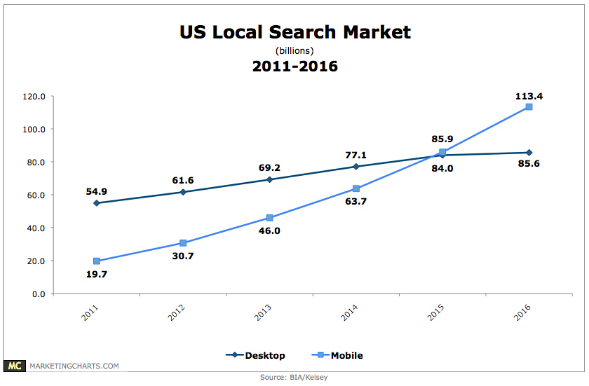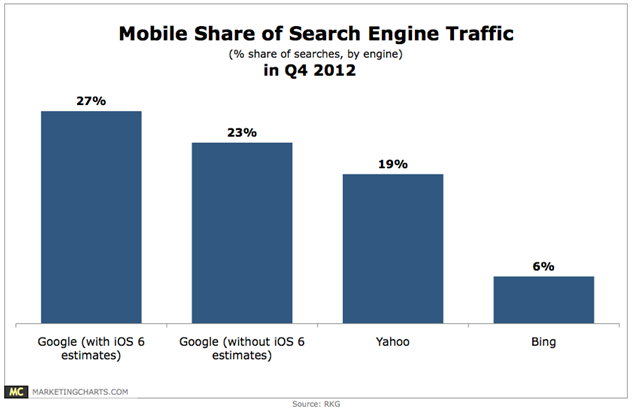Lyena Solomon is the Director of Search for MileStone Internet Marketing, Inc. Anil Aggarwal, CEO, has appeared in eCornell’s Ask the Expert segments for our New Media Course for Hospitality Professionals.
Do you know any adults who do not have a cell phone? Probably not. In a recent study by comScore MobiLens, there is a steady growth in adoption of smart phones in the US. It is predicted that in November 2012, 53% of the US mobile subscribers owned a smartphone.
One of the most popular mobile activities is search. According to BIA/Kelsey, mobile searches will bypass desktop counterparts by 2015.
Most of the mobile searches happen on Google. RKG’s estimates 27% of Google searches will be via mobile in Q4-2013. Mobile share of organic and direct traffic is expected to rise as well.
Source: http://www.marketingcharts.com/wp/interactive/mobile-share-of-web-traffic-jumped-in-q4-2012-26057/
What do people search for? According to a February 2012 study done by Localeze and 15miles, 92% of US smartphone users look up information about local businesses on their mobile devices. The same study shows that 86% of the local searches on tablets and almost 75% of mobile phone searches resulted in a purchase.
According to eMarketer, 20% of travelers in the US will make reservations on smart phones in 2013. Of course, in order to take a piece of the “mobile shoppers” market share, your website needs to be mobile accessible. At Milestone, we see mobile traffic share anywhere from 25% to 42% on our clients’ sites. And the numbers are growing.
Moreover, cell phone users carry their precious devices with them all the time; and according to Cisco Study, many check their devices every 10 minutes. A research done by Prosper Mobile Insights reveals that people are also planning to spend even more time on their mobile devices. The predicted number of people who plan to shop on their mobile devices has almost doubled in 2013.
If you are still not sure if you need a mobile website, the answer is a resounding “yes!” The remaining question, however, is – in what kind of mobile website should you invest in?
Mobile website vs. Responsive design website
There are two options for you: mobile website and responsive design website.
Mobile website is a separate site, designed for mobile phones and mobile browsers. It has a different overall design, sporting big buttons, click-to-call phone numbers, and lighter content that is focused for mobile user. Mobile sites usually feature maps, directions, and simple forms.
The main benefit of having a mobile site is that you can target your mobile audience very well. You can put all the information they are looking for right at their finger tips. Your mobile site will work on smart phones as well as dumb phones.
The drawbacks are several. Since your desktop site and mobile site are two separate entities, when you update your website, you will need to update your mobile site as well. You will have to allocate internal resources for mobile site development and content re-writing and adjustment, like scaling down the images. If you have a huge site, it might take a long time to scale the site down and determine what content to include in the mobile website. There are also some code adjustments you need to do for search engines. In addition, there are limitations on tracking your visitors and their actions on your mobile site.
If those drawbacks are deal breakers, then the second option might be best for your hotel.
Responsive Design – There are many benefits to responsive design. The main benefit is that once implemented, the website will scale based on what device was used by the visitor – desktop or laptop, mobile phone, or tablet. Images, columns, navigation will all adjust to the device size and resolution, taking up the entire screen real estate. In addition, because you only have one single site, It requires little maintenance once implemented and is a good long term solution. A responsive website benefits from exposure to all visitors – mobile or desktop – and steadily gains popularity on the website because of links and sharing.
Sounds perfect? Well, there are still some drawbacks.
The main consideration is that it will take a lot of resources to design and implement the new website layout. The first step is to define a fluid design and concept for the website. Next, the code and queries for responsive design must them be implemented on each and every page of the site. Yes, I mean it – each and every page. And because there are more codes, this can lead to higher download time. In this case, the site would need to be re-evaluated and adjusted to make it load faster.
But wait, that’s not it. The website content then needs to be reviewed and edited to accommodate both desktop and mobile viewers. If the website has a lot of content, it will need to be reduced. It is important to be very selective about what content to keep and what can be deleted because every page can and will be accessible on every device. With a small screen and less time to browse, it’s important to present the most important content to mobile users. It is critical to have concise content, friendly navigation, and quick-loading images in order to delight mobile users.
There is an attempt by Google to help pick a mobile site solution for your business. In their blog post, Google attempts to help businesses select the right solution by comparing available options.
What mobile solution is best for you?
Whether it’s responsive design or mobile website, it has to fit your business and your visitors.
We recommend responsive design if you have a small website that has similar goals for mobile and desktop visitors. It is also a good solution if your website has uniform content and not very complex. If you are redesigning your website or just creating one, it might be a good idea to also invest in responsive design. One thing’s for sure – be ready for an extensive initial development.
If you have an established website, you might want to stick with your mobile site for now. When you are ready to redesign your website, plan for the extensive work on making your redesign responsive. Another reason to have a customizable mobile site is if your mobile visitors differ significantly from their desktop counterparts. If you, the business owner, have a different goal for those who use mobile devices to look at your website, you might be better off with a separate mobile website.
There isn’t a single “general” recommendation for a business mobile site. Look at your business and select the appropriate option for you.
Milestone Internet Marketing offers both mobile sites and responsive design sites to our customers. For more information about our mobile services or to get a pricing quote, call us at 408-492-9055 or email sales@milestoneinternet.com. We’d be more than happy discuss the options and pick the right solution that best fits your business’ needs.
This is reposted from the Milestone Internet Blog.

Latest posts by Lyena Solomon (see all)
- Mobile Site vs Responsive Design Site – Which One is Right for You? - February 15, 2013

